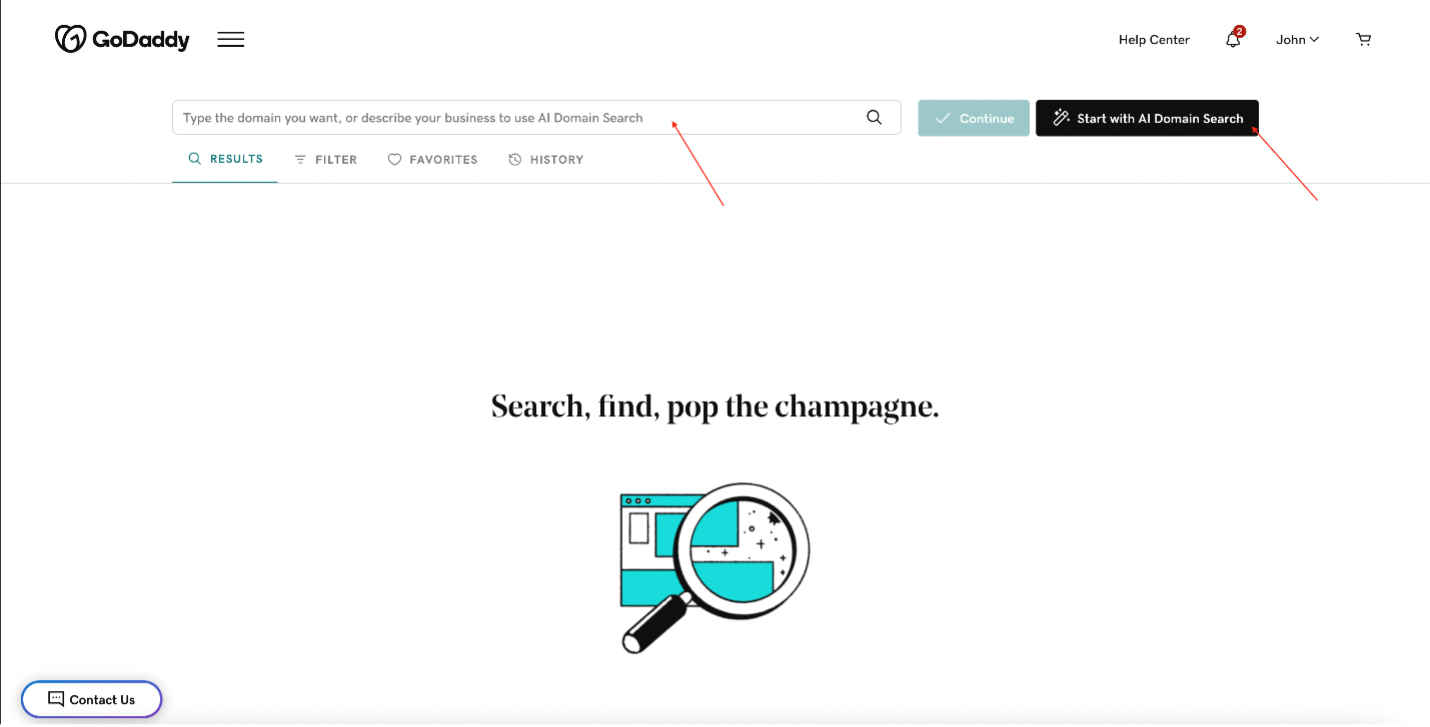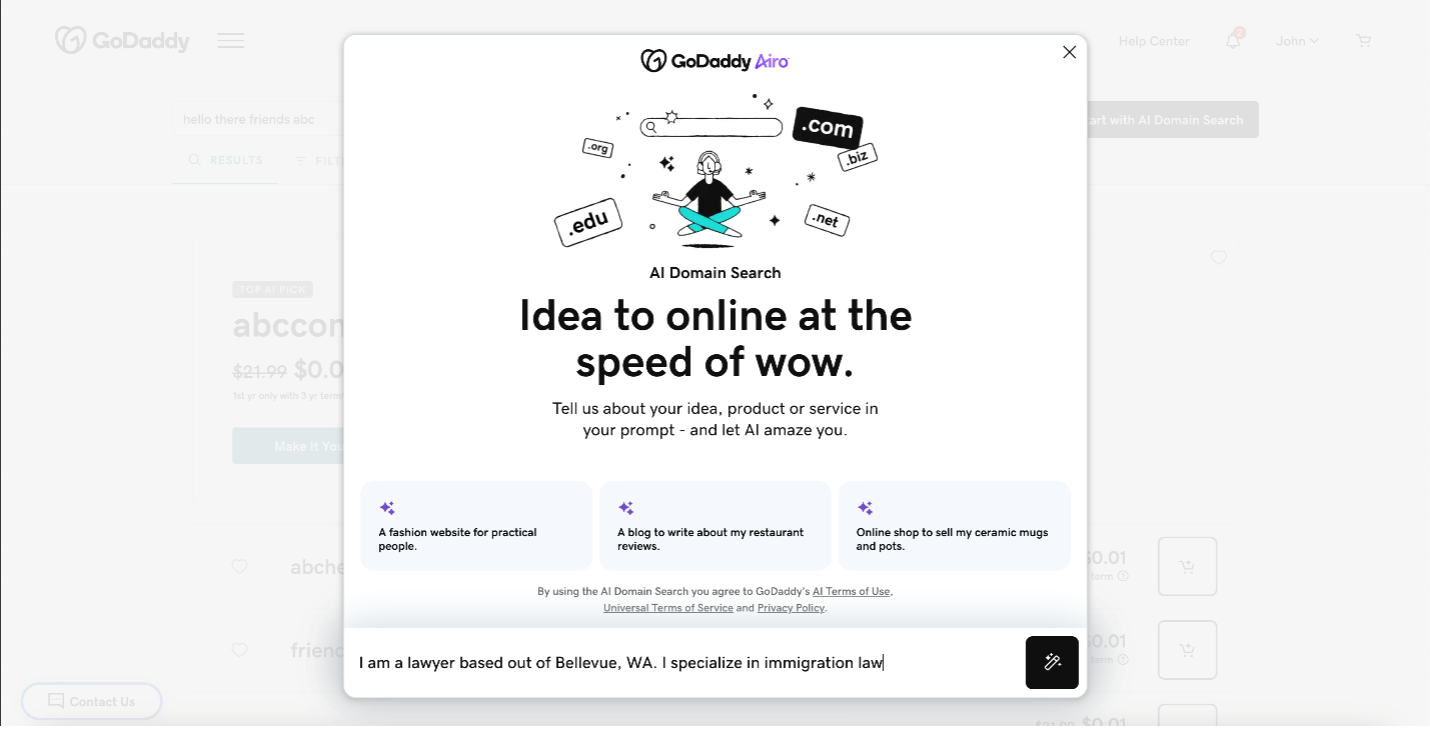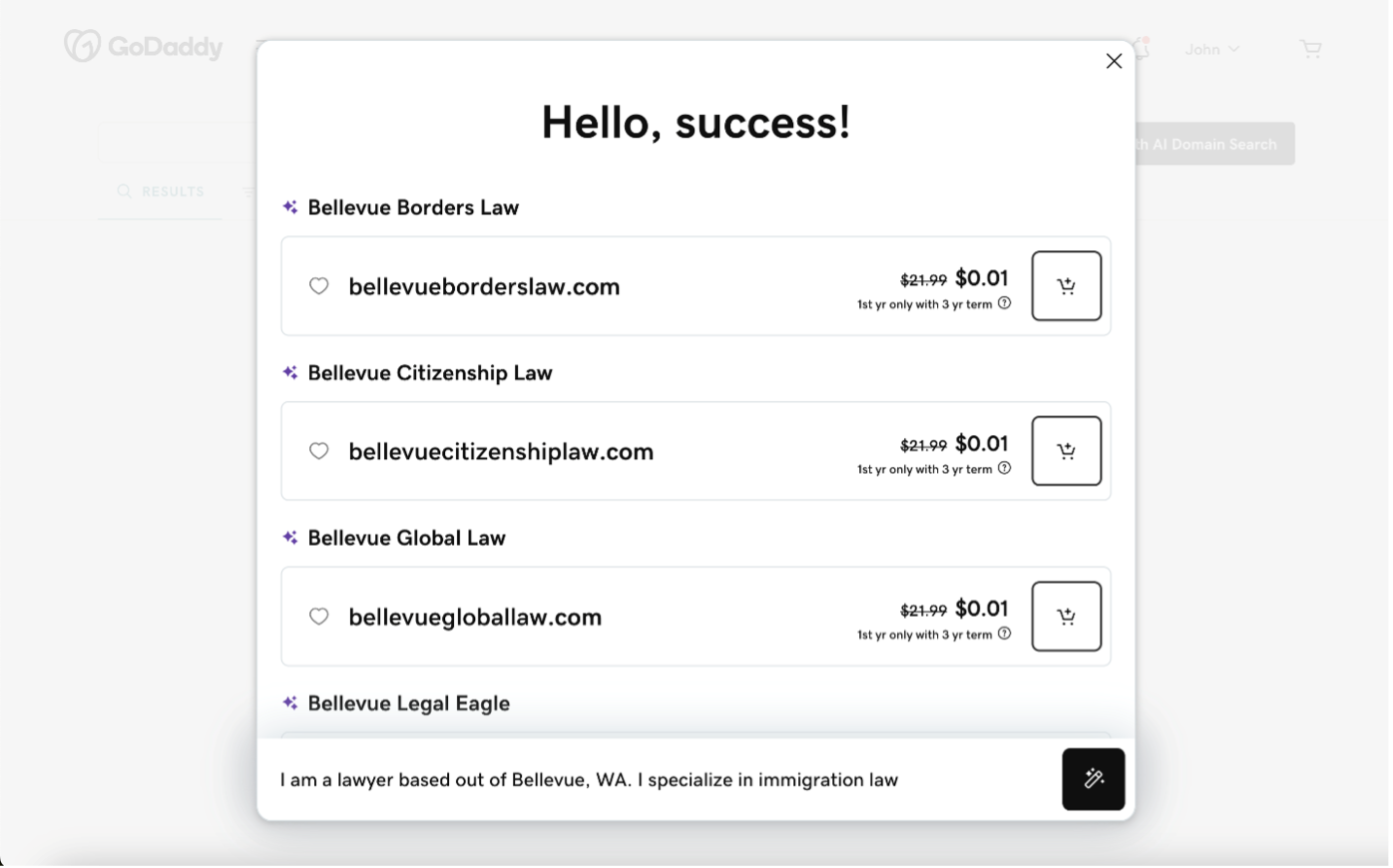In today’s digital landscape, finding the perfect domain name can be a challenge for customers. GoDaddy’s AI Domain Search addresses this issue by integrating Large Language Models (LLMs), like GPT, into its domain generation process, enhancing the ability to deliver relevant and available domain suggestions.
GPT excels in understanding user queries and generating domain names that resonate with specific needs. Its multilingual capabilities also allow us to serve a global audience, accommodating diverse linguistic preferences.
Our journey with LLMs began with the launch of the GoDaddy plugin in the OpenAI Plugin Store. This plugin allowed customers to perform conversational searches, discovering real-time, available domains generated and selected by ChatGPT. The positive user interest and conversion rates following the launch spurred us to develop our own in-house AI-powered domain search, which we integrated into the GoDaddy search experience to better serve our customers.
What is Generative AI Domain Search?
Generative AI (GenAI) search involves utilizing GenAI models, like LLMs, to improve and redefine how search engines deliver information. Unlike conventional search engines that depend on indexing large datasets and retrieving results through keyword matching, GenAI search can grasp the context, intent, and subtleties of a query, providing more thorough and contextually appropriate responses.
GenAI Domain Search is GoDaddy’s AI based domain search, which was launched as a new feature on the search engine results page (SERP) which enables customers to enter a brief description or idea about a new business they are interested in and use the power of GenAI to get available domain recommendations.
The experience can be initiated by clicking the “Start with AI Domain Search” button at the top of the SERP page next to the domain search bar, or by entering a description (four or more words) in the domain search bar.

Within the AI domain search modal, users can type in a description for their business, idea, or basically anything that is on their mind.

The user is then presented with a list of available domain names with their pricing, that most closely matches the description they entered, using the power of GenAI. Users have the option to favorite domain names they like or go ahead and purchase the ones they like the most. For example, typing ” I am a lawyer based out of Bellevue, WA. I specialize in immigration law” provides the following URLs and pricing:

The AI domain search component is a React-based component that internally uses the UxCore framework (GoDaddy’s internal UX framework) which provides designs, themes, shared components to ensure a consistent look and feel for the UI across GoDaddy. This opens future possibilities for embedding this component in other parts of our website like domainconnect.godaddy.com and cart.godaddy.com, where our customers search for domains.
Implementation
The following diagram outlines the sequence of steps each request undergoes in AI Domain Search:

Fig 1: Flow diagram of AI domain search
The process starts by analyzing the user query, where we utilize natural language processing to identify and redact personally identifiable information. This ensures that user queries are sanitized, and sensitive data is securely removed.
After the user queries are sanitized, our domain retrieval process enters a sophisticated phase that leverages advanced GenAI technologies to deliver domain name suggestions that are both highly relevant and creatively diverse. This process hinges on two critical components, vector databases and an internal LLM.
Vector database: At the heart of our retrieval process is an advanced vector database responsible for fetching the top-k most relevant domain names from an extensive pool of 400 million carefully curated options. These domains originate from an initial dataset of over 1 billion names, meticulously scraped by our in-house LLM. However, raw data is just the starting point. We apply multiple layers of guardrails to refine this pool—personalizing suggestions, ensuring availability, and filtering out inappropriate or irrelevant terms such as taboo words and stop words. The vector database employs BGE embeddings to calculate the cosine similarity between the user’s sanitized query and the available domain names. This ensures that the results are highly aligned with the user’s specific needs and preferences, maximizing relevancy in each suggestion.
LLM component: Complementing the vector database is real-time LLM, powered by internal GoDaddy Content-as-a-Service (CaaS) platform. The LLM generates additional top-k domain suggestions. These suggestions go beyond mere alignment with the query; these are creative, diverse set of name suggestions that offer a tailored set of options. This dynamic process enables us to explore unique, unconventional possibilities, ensuring that customers receive a selection of compelling and imaginative domain names.
In addition to the previously mentioned components, we use relevancy and diversity as strategic levers. The interplay between relevancy and diversity in our domain suggestions is central to our approach. Relevancy ensures that the domain names closely match the user’s query and intent, while diversity introduces a layer of innovation, offering options that may inspire new directions or ideas for our customers. These two levers are not static; they are continuously optimized through rigorous A/B testing. Experimenting with different balances of relevancy and diversity allows us to fine-tune our system to better meet customer needs, enhancing both user satisfaction and conversion rates.
By leveraging the strengths of both components and constantly experimenting with relevancy and diversity, we strike an optimal balance that caters to both practical needs and creative aspirations. The vector database ensures that domain names are closely aligned with the query, while the LLM adds a visionary touch, offering options that stand out in a crowded digital landscape. Each domain name undergoes rigorous availability checks, guaranteeing that customers can act immediately on their chosen domain, making the process seamless and efficient. This approach not only enhances the user experience but also underscores our commitment to pushing the boundaries of AI domain search, ensuring that every customer finds a domain name that truly reflects their brand and vision.
Behind the scenes: The platform that powers AI experiences at GoDaddy
The CaaS platform is a game-changer for the company and its teams. This platform is designed to provide a unified onboarding experience for teams getting on the GenAI train, offering a centralized platform that encompasses GenAI technologies for all products. With the necessary abstractions and guidance in place, it ensures that all services meet the performance and availability SLAs that GoDaddy expects.
Primary goals of GoDaddy’s CaaS platform:
• Simplify and standardize processes for teams through abstractions and guidance to meet the performance and availability standards that GoDaddy demands.
• Centralize learning, wherein, teams can learn from one another's experiments and experiences, rather than operating in isolated silos.
• Expose interfaces around various technologies in a provider-agnostic way, providing the flexibility for teams to stay ahead of the curve and leverage the best tools available to drive innovation and success.
• Centralize billing, so developers can focus on their work without the burden of dealing with contracts and other artifacts resulting from direct third-party integrations.
Conclusion
Most of our consumers come to our website with a new idea for their business, and oftentimes the first step involves choosing a name for it. Choosing the right domain name enhances brand recognition, boosts search engine optimization, and improves user experience. It creates a professional, memorable identity, increases online visibility, and helps distinguish the business from competitors. We aim to simplify this process of brainstorming and finding the perfect domain name for their business with the launch of GenAI Domain Search.






